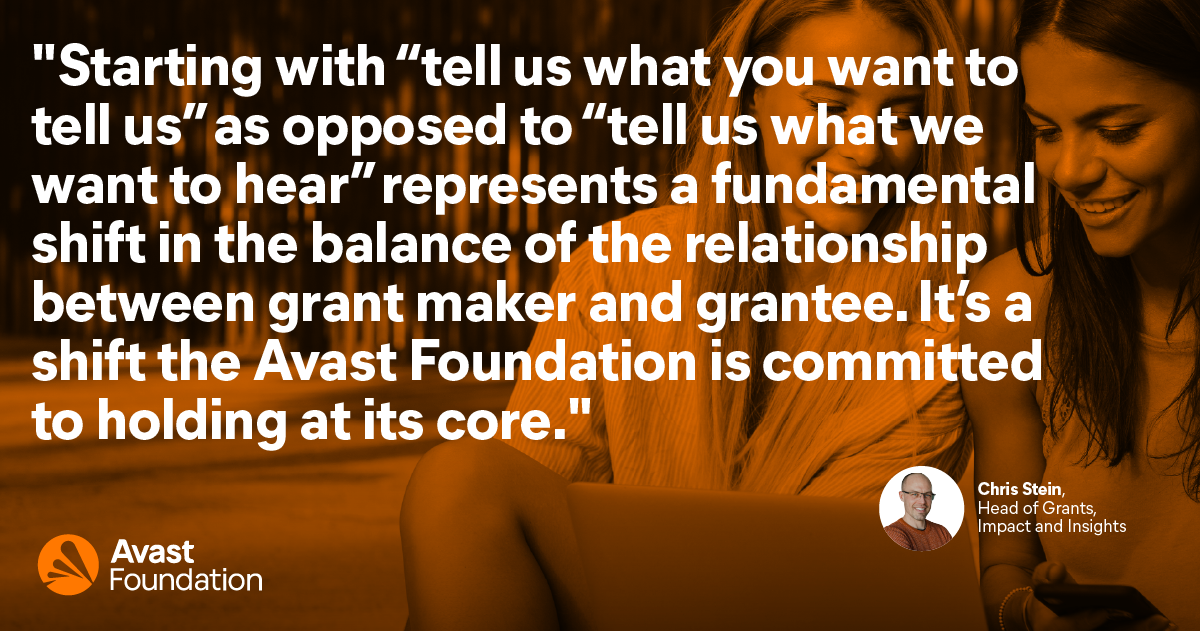So it is, sometimes, with measuring the outcomes and impact of work delivered to support communities and wider society. “How many people attended?” “How much work did they do?” “What was the level of satisfaction” “How much did the scores change?” While quantitative data are valuable and necessary, they rarely tell the whole story, and to understand impact, it’s necessary to hear from the end beneficiaries about the changes they’ve experienced and the outcomes they value.
At the Avast Foundation, we do our best to emphasize this qualitative storytelling and understanding, along with quantitative data. So when CARE Czech Republic, a delivery partner supported by the Avast Foundation, contacted our team to clarify the structure of an upcoming report, rather than merely emailing back a template, we scheduled a call. The topic of the conversation was the value of reporting to the Foundation, the value to CARE CZ and, more importantly, the value of reporting to the community served under this grant.
The project seeks to provide digital tools to girls and young women aged 14 to 30 in Western Georgia, a region that CARE has worked in for many years. This particular demographic often experiences an acute level of marginalization, and many of the young people supported live in areas that are not well connected digitally. By providing access and education to digital tools alongside the development of technical skills, including safety and online awareness, the project inherently addresses social gaps while building individual capacity.
Many of the project’s aims will be supported through deliverables such as workshops with young people in the target group, so why not just report the number of attendees, the number of sessions, and the satisfaction score? While all these metrics may be telling, the Avast Foundation champions a new approach to 21st century philanthropy, which means going beyond merely providing funds to creating meaningful relationships with partners and communities based on principles of trust, equality, and humility. We firmly trust our partners and believe that they know the political, economic, social, technological, legal and environmental contexts in which they operate far better than we can ever hope to. Their existence precedes and continues after the grant made by the Avast Foundation and the benefits to the communities they support radiate far beyond the work they deliver at any given moment in time.
This approach represents a fundamental - and sometimes uncomfortable - shift for both funders and partner organizations. “Tell me what you want to tell me” is how Chris Stein, Head of Grants and Impact opened the conversation with CARE representatives from Georgia and Czech Republic. After an initial moment of silent surprise, the CARE team started to share stories of delivering much needed infrastructure and skills to underserved localities, young people learning about the digital sphere, increasing their knowledge and confidence along the way. From their descriptions, it was clear that the project delivery team has a strong focus on understanding personal networks and friendships, leveraging their strength to help participants learn key skills well before looking at transactions that might happen digitally. And the approach appeared to be working: young people who had been through the programme once, were coming back to build on their knowledge. Is there anything more affirming than a service user coming back to you!? The team also shared that the project is generating interest among local authorities, and that this interest is helping the CARE team and community to develop their relationship with administrative leaders. Going beyond all of these positive moves is the fact that CARE is strengthening self-efficacy, for themselves, for their community, and for the individual young people they are supporting.
Starting with “tell us what you want to tell us” as opposed to “tell us what we want to hear” represents a fundamental shift in the balance of the relationship between grant maker and grantee. It’s a shift the Avast Foundation is committed to holding at its core. The funded program extends through the end of 2022, and we look forward to hearing - and sharing - more outcomes and insights from the team’s work with girls and young women throughout the year.

